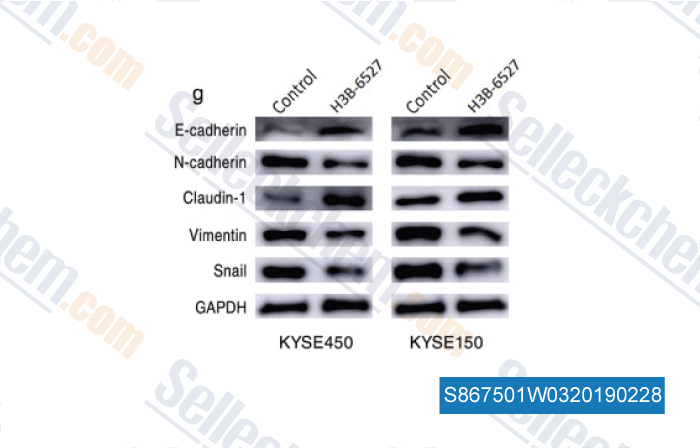|
Toll Free: (877) 796-6397 -- USA and Canada only -- |
Fax: +1-832-582-8590 Orders: +1-832-582-8158 |
Tech Support: +1-832-582-8158 Ext:3 Please provide your Order Number in the email. |
Technical Data
| Formula | C29H34Cl2N8O4 |
|||
| Molecular Weight | 629.54 | CAS No. | 1702259-66-2 | |
| Solubility (25°C)* | In vitro | DMSO | 50 mg/mL (79.42 mM) | |
| Water | Insoluble | |||
| Ethanol | Insoluble | |||
|
* <1 mg/ml means slightly soluble or insoluble. * Please note that Selleck tests the solubility of all compounds in-house, and the actual solubility may differ slightly from published values. This is normal and is due to slight batch-to-batch variations. * Room temperature shipping (Stability testing shows this product can be shipped without any cooling measures.) |
||||
Preparing Stock Solutions
Biological Activity
| Description | H3B-6527 is a highly selective covalent FGFR4 inhibitor with an IC50 value of <1.2 nM and at least 250-fold selectivity over FGFR1-3 (IC50 values of 320, 1,290 and 1,060 nM respectively). | ||
|---|---|---|---|
| Targets |
|
||
| In vitro | H3B-6527 shows robust inhibition of the target kinase FGFR4 with an IC50 value of <1.2 nmol/L and at least 250-fold selectivity over FGFR1-3 (IC50 values of 320, 1,290 and 1,060 nmol/L respectively). TAOK2, JNK2, and CSF1R are also less sensitive to H3B-6527 treatment with IC50 values of 690, >10,000, and >10,000 nmol/L, respectively. H3B-6527 inhibits FGFR4 signaling, proliferation, and leads to apoptosis in a HCC cell line (Hepatocellular carcinoma). Treatment on Hep3B cells leads to robust activation of caspase-3/7, an apoptotic marker, in a concentration-dependent manner, indicating FGFR4 inhibition by H3B-6527 leads to cell death in HCC cell lines. H3B-6527 has the selectivity and the selective dependence on FGFR4 across cancer types[1]. |
||
| In vivo | In the Hep3B human HCC xenograft mouse model, H3B-6527 shows dose-proportional plasma exposures and greater than dose-proportional tumor exposures within the dose range evaluated (30, 100, and 300 mg/kg). The H3B-6527 pharmacodynamic response as measured by CYP7A1 mRNA and pERK1/2 protein levels is dose dependent, with higher doses leading to sustained responses. Oral treatment of H3B-6527, twice daily, inhibits xenograft growth in a dose-dependent manner in nude mice, with the 300 or 100 mg/kg twice daily, significantly inhibiting tumor growth in both Hep3B subcutaneous and orthotopic xenograft model and causing tumor regressions in the subcutaneous xenograft model. |
Protocol (from reference)
| Cell Assay: |
|
|---|---|
| Animal Study: |
|
Customer Product Validation

-
Data from [Data independently produced by , , Thorac Cancer, 2018, 9(12):1687-1698]
Selleck's H3B-6527 has been cited by 13 publications
| Paradoxical cancer cell proliferation after FGFR inhibition through decreased p21 signaling in FGFR1-amplified breast cancer cells [ Breast Cancer Res, 2024, 26(1):54] | PubMed: 38553760 |
| Compartmentalization and synergy of osteoblasts drive bone formation in the regenerating fin [ iScience, 2024, 27(2):108841] | PubMed: 38318374 |
| FGFR4 and EZH2 inhibitors synergistically induce hepatocellular carcinoma apoptosis via repressing YAP signaling [ J Exp Clin Cancer Res, 2023, 42(1):96] | PubMed: 37085881 |
| FGFR4 and EZH2 inhibitors synergistically induce hepatocellular carcinoma apoptosis via repressing YAP signaling [ J Exp Clin Cancer Res, 2023, 42(1):96] | PubMed: 37085881 |
| Unraveling the Mechanisms of Sensitivity to Anti-FGF Therapies in Imatinib-Resistant Gastrointestinal Stromal Tumors (GIST) Lacking Secondary KIT Mutations [ Cancers (Basel), 2023, 15(22)5354] | PubMed: 38001614 |
| Indoxyl sulfate induces left ventricular hypertrophy via the AhR-FGF23-FGFR4 signaling pathway [ Front Cardiovasc Med, 2023, 10:990422] | PubMed: 36895836 |
| Indoxyl sulfate induces left ventricular hypertrophy via the AhR-FGF23-FGFR4 signaling pathway [ Front Cardiovasc Med, 2023, 10:990422] | PubMed: 36895836 |
| BCL-XL inhibition induces an FGFR4-mediated rescue response in colorectal cancer [ Cell Rep, 2022, 38(7):110374] | PubMed: 35172148 |
| Strategies to inhibit FGFR4 V550L-driven rhabdomyosarcoma [ Br J Cancer, 2022, 10.1038/s41416-022-01973-6] | PubMed: 36097178 |
| FGF15 promotes hepatic NPC1L1 degradation in lithogenic diet-fed mice [ Lipids Health Dis, 2022, 21(1):97] | PubMed: 36209166 |
RETURN POLICY
Selleck Chemical’s Unconditional Return Policy ensures a smooth online shopping experience for our customers. If you are in any way unsatisfied with your purchase, you may return any item(s) within 7 days of receiving it. In the event of product quality issues, either protocol related or product related problems, you may return any item(s) within 365 days from the original purchase date. Please follow the instructions below when returning products.
SHIPPING AND STORAGE
Selleck products are transported at room temperature. If you receive the product at room temperature, please rest assured, the Selleck Quality Inspection Department has conducted experiments to verify that the normal temperature placement of one month will not affect the biological activity of powder products. After collecting, please store the product according to the requirements described in the datasheet. Most Selleck products are stable under the recommended conditions.
NOT FOR HUMAN, VETERINARY DIAGNOSTIC OR THERAPEUTIC USE.
